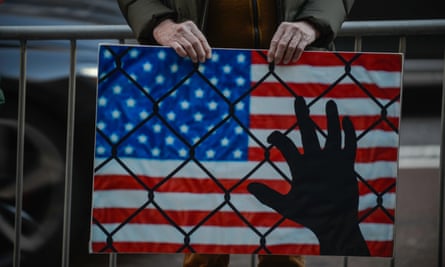US lawmakers are calling on the Biden administration to reduce the number of immigrants enrolled in a controversial surveillance program and rethink the US government’s exclusive contract with the private company managing the program.
In a letter to the head of the Department of Homeland Security, Alejandro Mayorkas, the group of Democratic lawmakers demands urgent changes to the intensive supervision appearance program (Isap), an effort introduced in 2004 as a “humane alternative” to immigration detention.
Led by Congresswoman Rashida Tlaib, the 25 lawmakers say the program is punitive, often subjecting immigrants to years of surveillance, and has failed to accomplish its stated purpose of reducing the number of immigrants in detention. Instead, the lawmakers say, immigrants who would otherwise be released are being subjected to electronic monitoring.
“Between 2006 to 2021, Isap’s budget increased from $28m to $475m, while the detention budget increased from $1bn to $2.8bn,” the letter reads. Immigration authorities “cannot reasonably call Isap an ‘alternative to detention’ if the program effectively subjects more immigrants to the agency’s supervision while it simultaneously expands formal detention programs.”
Tlaib said in a statement: “People coming to America are simply seeking a chance at a better life just as countless others have before them, and want nothing more than a safe place to live and raise their families.
“Our country must move away from policies that unnecessarily detain immigrants en masse – policies that only exist to satiate the narratives of race-baiting nativist activists and enrich the private prison and detention and surveillance industrial complex corporations.”
Managing Isap on behalf of Ice is BI Inc, a subsidiary of the Geo Group, one of the US’s largest private prison corporations.
As the program exists today, immigrants enrolled can go home rather than remain detained after having sought asylum or having been detained, but they are assigned a “supervision” regime by Immigration and Customs Enforcement (Ice). That regime must include one type of electronic monitoring – an ankle monitor, facial recognition check-ins to a smartphone app, or leaving voice messages to be analyzed by voice recognition, according to Ice’s current contract with BI. It can also include a combination of weekly or semi-regular home or in-office visits. While those enrolled in such surveillance are often relegated to certain states or geographic areas, they are typically free to leave their home except on days that they have home visits.

About 182,000 immigrants are enrolled in the program today, according to Ice, making it the largest supervision program of any US law enforcement agency. But the Biden administration has plans to expand the number of people that can be enrolled and test the addition of a new, stricter level of surveillance that would require immigrants in Isap to stay home for 12 hours a day, according to Reuters. The government would again tap BI to run that pilot.
In their letter, the lawmakers charge that Ice is already excessively deploying Isap surveillance. “Ankle shackles, once a rarity, are now ‘standard equipment’. Individuals previously considered low risk such as family units, asylum seekers, or pregnant or nursing people are subjected to intensive supervision and for excessive periods of time,” they write.
They charge that the program has led to “extreme physical and mental damage” for immigrants enrolled and has made it difficult for participants to integrate in American society.
DHS and Ice declined to comment. Jessica Mazlum, a spokesperson for BI, said the accusations were “unverified, irresponsible and politically motivated.
“The allegation that BI GPS devices are in any way physically unsafe for the individuals wearing them is blatantly false,” she said in a statement.
The lawmakers are also concerned about how BI collects and shares user data through SmartLink, the app it requires immigrants to use, saying its privacy policy is overly broad and that Ice and BI should be more transparent about what data they collect.
Without federal laws regulating the use of consumer information, that personal data could be used in other law enforcement contexts or sold to the highest bidder, Julia Mao, the deputy director of the immigration rights organization Just Futures Law, said.
“We are concerned that some of this data could be shared and monetized,” Mao said. “And then we’re also concerned about the amount in which the mic, the camera, the contact list, photos, all of that could be accessed for uses outside of the temporal Ice check-in.”
In their letter to Mayorkas, the lawmakers say there is precedent for these concerns: “We already know that data collected from ankle shackles has been used to conduct enforcement and deportation operations,” the letter reads.
“This technology has the capability of surveilling not only the subject but also bystanders – including US citizens and individuals with legal status – raising further civil rights concerns and creating a potential for unwarranted surveillance of US residents without just cause, their knowledge or their consent.”
BI referred all questions about privacy and data policies governing SmartLink to Ice.
BI signed a new five-year, $2.2bn exclusive contract to run Isap for Ice in 2020.
“As President Biden indicated earlier this year, private entities should not profit from incarceration,” the lawmakers state in the letter. “The same applies here – no private entity should profit from surveillance and e-carceration.”
